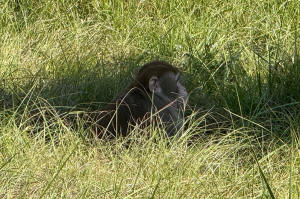Mississippi woman kills escaped monkey fearing for her children's safety
[November 03, 2025]
By MIKE SCHNEIDER
One of the monkeys that escaped last week after a truck overturned on a
Mississippi highway was shot and killed early Sunday by a woman who says
she feared for the safety of her children.
Jessica Bond Ferguson said she was alerted early Sunday by her
16-year-old son who said he thought he had seen a monkey running in the
yard outside their home near Heidelberg, Mississippi. She got out of
bed, grabbed her firearm and her cellphone and stepped outside where she
saw the monkey about 60 feet (18 meters) away.
Bond Ferguson said she and other residents had been warned that the
escaped monkeys carried diseases so she fired her gun.
“I did what any other mother would do to protect her children,” Bond
Ferguson, who has five children ranging in age from 4 to 16, told The
Associated Press. “I shot at it and it just stood there, and I shot
again, and he backed up and that's when he fell.”
The Jasper County Sheriff's Office confirmed in a social media post that
a homeowner had found one of the monkeys on their property Sunday
morning but said the office didn't have any details. The Mississippi
Department of Wildlife, Fisheries, and Parks took possession of the
monkey, the sheriff's office said.
Before Bond Ferguson had gone out the door, she had called the police
and was told to keep an eye on the monkey. But she said worried that if
the monkey got away it would threaten children at another house.

“If it attacked somebody's kid, and I could have stopped it, that would
be a lot on me,” said Bond Ferguson, a 35-year-old professional chef.
“It's kind of scary and dangerous that they are running around, and
people have kids playing in their yards.”
The Rhesus monkeys had been housed at the Tulane University National
Biomedical Research Center in New Orleans, Louisiana, which routinely
provides primates to scientific research organizations, according to the
university. In a statement last week, Tulane said the monkeys do not
belong to the university, and they were not being transported by the
university.
A truck carrying the monkeys overturned Tuesday on Interstate 59 north
of Heidelberg. Of 21 the monkeys in the truck, 13 were found at the
scene of the accident and arrived at their original destination last
week, according to Tulane. Another five were killed in the hunt for them
and three remained on the loose before Sunday.
[to top of second column]
|

This photo provided by Scotty Ray Boyd shows an escaped monkey
sitting in the grass Tuesday, Oct. 28, 2025, in Heidelberg, Miss.
(Scotty Ray Boyd via AP)

The Mississippi Highway Patrol has said it was investigating the cause
of the crash, which occurred about 100 miles (160 kilometers) from the
state capital, Jackson.
Rhesus monkeys typically weigh about 16 pounds (7.2 kilograms) and are
among the most medically studied animals on the planet. Video recorded
after the crash showed monkeys crawling through tall grass beside the
interstate, where wooden crates labeled “live animals” were crumpled and
strewn about.
Jasper County Sheriff Randy Johnson had said Tulane officials reported
the monkeys were not infectious, despite initial reports by the truck’s
occupants warning that the monkeys were dangerous and harboring various
diseases. Nonetheless, Johnson said the monkeys still needed to be
“neutralized” because of their aggressive nature.
The monkeys had recently received checkups confirming they were
pathogen-free, Tulane said in a statement Wednesday.
Rhesus macaques “are known to be aggressive,” according to the
Mississippi Department of Wildlife, Fisheries and Parks. It said the
agency’s conservation workers were working with sheriff’s officials in
the search for the animals.
The search comes about one year after 43 Rhesus macaques escaped from a
South Carolina compound that breeds them for medical research because an
employee didn’t fully lock an enclosure. Employees from the Alpha
Genesis facility in Yemassee, South Carolina, had set up traps to
capture them.
All contents © copyright 2025 Associated Press. All rights reserved
 |